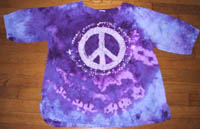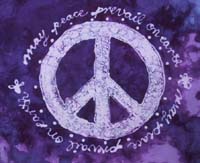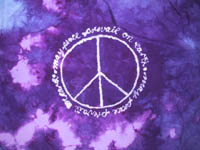 Home Page
Hand Dyeing Top
Gallery
About Dyes
How to Dye
How to Tie Dye
How to Batik
Low Water Immersion Dyeing
Sources for Supplies
Book Reviews
Other Galleries
Groups
FAQs
Custom Dyers
Forum
Q&A blog
link here
search
contact me
Home Page
Hand Dyeing Top
Gallery
About Dyes
How to Dye
How to Tie Dye
How to Batik
Low Water Immersion Dyeing
Sources for Supplies
Book Reviews
Other Galleries
Groups
FAQs
Custom Dyers
Forum
Q&A blog
link here
search
contact me
May Peace Prevail On Earth:
single-wax batik with low water immersion dyed background
March 2003
I love the effect of dyeing waxed fabric. The borders
between the design and ther background are so crisp, and yet
the fabric is totally soft after the wax is removed. All three of the pictures below link to larger copies of
themselves. The first and second show the design on the front, while the
third shows the design on the back of the shirt.



How I did it
drawing
I drew a peace sign on a plain prewashed white rayon shirt,
which had NOT been pre-soaked in soda ash solution,
using a pencil, ruler, compass, protractor and two sizes of dinner plates.
This was more difficult than with the pre-soaked shirts, as
the soda ash helps to stiffen the fabric and make it easier
to write upon.
waxing
I melted a mixture of beeswax and paraffin in an electric
skillet set to 270 degrees Fahrenheit (132 degrees C) and
used a tjanting (handle wrapped in tape to form a stop so it
would not slide into the skillet when rested in the skillet)
to apply the wax. I held a rag in my non-dominant hand to
catch drips so they would not fall between the skillet and
the target, and I covered large areas of the fabric with
dinner plates where I did not want any drips to
fall. (Beeswax and paraffin are safe for human consumption,
so it's okay to get them on tableware - though it would be
handier, I must say, to use something disposable such as
cardboard.)
I filled in the area of the large peace sign on the front of
the shirt with a complex curlicue design, then painted on
wax with a paintbrush on top of it. Even though the result
is solid wax, the original lines show up in the final
design.
I wrote the words "may peace prevail on earth", in my usual
handwriting, with the tjanting. (I count being able to use
my usual handwriting under all sorts of circumstances, as
when writing on an Etch-a-Sketch® or writing with my feet, as
one of my special though not very useful skills, along with being able to spot
four-leaf clovers without consciously looking for them.)
The back was separated from the front with a baking sheet so
no wax could penetrate; I repeated the process on the back.
dyeing
I dyed the shirt by crumpling it and placing it in a bowl in
which I had already placed a cup of water containing a
mixture of Procion type red MX-8b (fuchsia), rubine MX-B
(bright pink), turquoise MX-G, blue MX-G (cerulean blue),
blue #9, and red MX-5B. (I had a number of stock solutions
already prepared.) Then I poured over it all a mixture of
turquoise MX-G, blue MX-G (cerulean blue), blue #9, and red
MX-5B, along with another cup of water. Finally I added one
cup (250 ml) of water in which 4 teaspoons (20 ml) of soda
ash had been dissolved. I allowed the container to rest in a
sink full of water that was comfortably hot to my hand, and
thus not hot enough to melt wax.
removing wax
I've never had such an easy time boiling out wax before. I
do believe that using real soap, instead of detergent, must
help. After running the shirt through the washing machine on
cold, with Synthrapol, to remove dye and soda ash, I added
several squirts of Dr. Bronner's brand liquid castile soap,
purchased in a whole foods store, to a large 3-gallon pot of
water. The wax was out of the fabric long before the water
could come to a boil. The shirt was then machine washed
several times, using the gentle cycle, to remove all excess dye.


Home Page
Hand Dyeing Top
Gallery
About Dyes
How to Dye
How to Tie Dye
How to Batik
Low Water Immersion Dyeing
Sources for Supplies
Book Reviews
Other Galleries
Groups
FAQs
Custom Dyers
Forum
Q&A blog
link here
search
contact me
Page created: March 30, 2003
Last updated: March 30, 2003
Downloaded: Sunday, February 22, 2026




